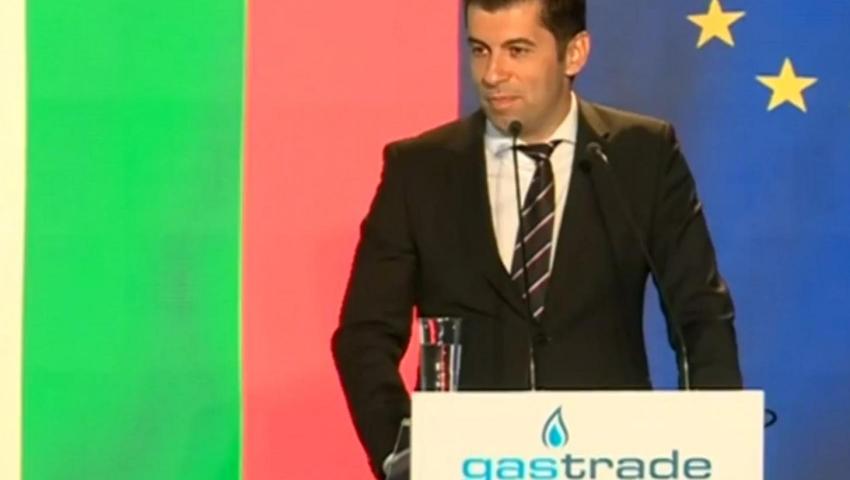Balkan leaders hope to replace Russian natural gas supplies to region in near future
The Bulgarian Prime Minister is participating in the start of the project for the construction of the LNG terminal near Alexandroupolis

Shot: New TV
Today (May 3) will be remembered in the political history of Bulgaria and Greece as a day of striving for economic freedom and political independence. This was stated by Prime Minister Kiril Petkov, who is involved in the start of construction of the liquefied gas terminal near the Greek city of Alexandroupolis. He thanked Greek Prime Minister Kyriakos Mitsotakis not only for the political support, but also for the one Bulgaria is currently receiving when Russia has cut off natural gas supplies.
According to Kiril Petkov, the parties can only oppose Russian pressure together. "We will soon be able to replace Russian gas with other sources," Mitsotakis said at the ceremony.
The Kremlin's economic blackmail against my country and the EU will not succeed. We will oppose. I am convinced that today will remain in political history. He will be remembered for our pursuit of economic freedom and independence, said Bulgarian Prime Minister Kiril Petkov.
Petkov described the suspension of gas supplies to Bulgaria as unprecedented pressure from Russia and pointed out that the countries of the Union can only oppose it united, BTA reported.
Greece will be able to accept increased quantities of liquefied gas and will not only cover the national market, but will replace much of Russia's gas for the Balkans. The new quantities will help us not to be dependent on Russian gas, said Mitsotakis - this will meet the challenges of the modern world, BNR quoted the Greek Prime Minister.
Petkov noted that this project will change the energy map of the entire region.
Dear friends, it is a real pleasure for me to be with all of you at the opening of this terminal. Russia's war in Ukraine has created a situation of urgency, but also of unity in the EU. We need to build our European sovereignty, we need to build a new energy independence. It is clear to everyone that together we can achieve change, said EU President Charles Michel.
Very few people believed in this project at the time. I was also skeptical. But now I am very grateful that we will be able to provide a large amount of natural gas. What needs to happen is to strengthen the infrastructure, said Serbian President Aleksandar Vucic.
Today, united by a common vision and supported by the European institutions, Bulgaria and Greece are launching a floating liquefied gas terminal. A not only energy, but also a geopolitical project that will change the energy map of the whole region, said Kiril Petkov.
The meeting was also attended by the Prime Minister of the Republic of Northern Macedonia Dimitar Kovachevski.
On the Bulgarian side, the event was also attended by the Minister of Energy Alexander Nikolov and the Executive Director of Bulgartransgaz Vladimir Malinov.
Background
In just two months, this is the second significant step in the project. At the end of February, the shareholders of the project company Gastrade approved the final investment decision for the construction of the so-called Independent Natural Gas System of Alexandroupolis, Greece.
The terminal, which should be ready in 2023, will provide new quantities of gas to supply regional markets in Southeast Europe. Companies from the United States, Qatar and Israel are expected to be the main suppliers. In this way, the project will contribute to the diversification of gas supply sources and routes, as well as to the promotion of competition for the benefit of end customers.
The Greek prime minister announced the event during a government meeting on Friday, stressing the importance of the terminal, which he said will help diversify natural gas supply sources not only for Greece but also for the region.
With a budget of € 363.7 million, the project envisages a floating platform for the reception, temporary storage and regasification of liquefied natural gas (LNG) and an underwater and overland 28-kilometer pipeline to access the national system. Through the existing routes, the gas will be able to reach Bulgaria, Serbia, the Republic of Northern Macedonia and other countries.
The project was developed by the consortium Gastrade with the participation of the Copelouzos Group, Gaslog Investment, DEPA Commercial, the transmission network operator DESFA and Bulgaria's Bulgartrans - with shares of 20 percent.
The planned capacity of the facility is 6.1 billion cubic meters per year. Among the reserved capacity is Bulgargaz with 500 million cubic meters per year. In 2021, the EU decided to award a grant of EUR 166.7 million (USD 199 million) for the project. The EC's arguments said the terminal would improve security and diversification of energy supplies in Southeast Europe.
